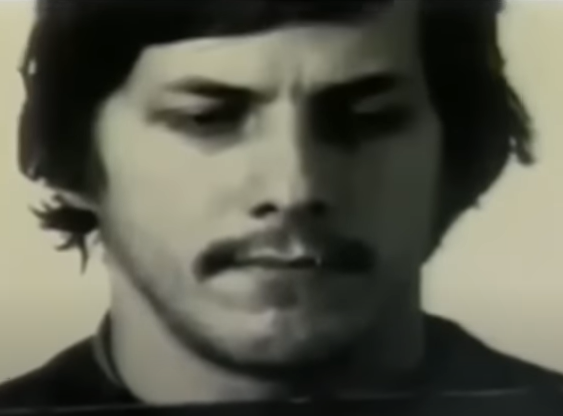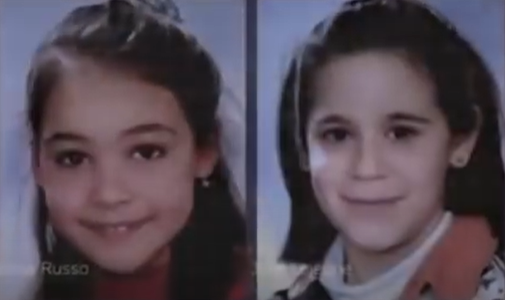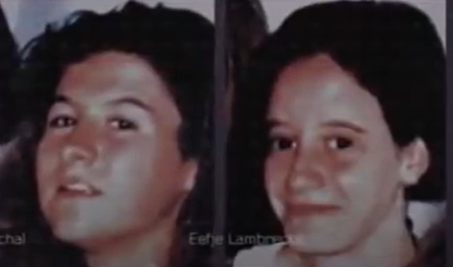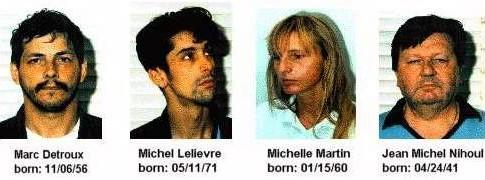
b: 1956
Summary
Name:
Marc Paul Alain DutrouxNickname:
The Monster of BelgiumYears Active:
1985 - 1996Birth:
November 06, 1956Status:
ImprisonedClass:
Serial KillerVictims:
4+Method:
Starvation / Sedation / Burying victims aliveNationality:
Belgium
b: 1956
Summary: Serial Killer
Name:
Marc Paul Alain DutrouxNickname:
The Monster of BelgiumStatus:
ImprisonedVictims:
4+Method:
Starvation / Sedation / Burying victims aliveNationality:
BelgiumBirth:
November 06, 1956Years Active:
1985 - 1996Date Convicted:
June 17, 2004bio
Marc Dutroux was born on 6 November 1956 in Ixelles, a district in Brussels, Belgium. He was the eldest of five children. Early in life, his family lived in Burundi, Africa, where his father worked as a teacher, but they returned to Belgium in 1962 after the country's independence. The Dutroux household was reportedly abusive, and Marc later claimed both his parents mistreated him. In 1972, his parents separated, and he left home not long after, eventually working as an electrician.

By 1976, Dutroux married his first wife, Françoise Dubois, and they had two children. However, the marriage ended in 1983 due to his violent and abusive behavior. During the late 1970s and 1980s, Dutroux drifted toward petty crime—stealing car parts, selling drugs, and assaulting others. His criminal activity escalated as he began stalking young girls at local skating rinks. Around this time, he began a relationship with Michelle Martin, a former schoolteacher who would later become his second wife and criminal accomplice. Together, they had three children.
In 1989, Dutroux was convicted of kidnapping, raping, and torturing five teenage girls with Martin and another accomplice, Jean van Peteghem. He was sentenced to 13.5 years but was released in 1992 after serving just three years, thanks to a decision made by Justice Minister Melchior Wathelet—despite warnings from psychiatrists and prosecutors that Dutroux remained dangerous. While on government disability assistance—claiming mental illness—he was also purchasing homes. He owned seven properties, three of which were used to kidnap, imprison, and torture young girls. In his most infamous house in Marcinelle, Dutroux constructed a hidden dungeon in the basement where many of his victims were held.
murder story
Following his early release in 1992, Marc Dutroux began building an operation that involved abducting young girls, sexually abusing them, and—on several occasions—murdering them. On 24 June 1995, Dutroux abducted two 8-year-old girls, Julie Lejeune and Mélissa Russo, in Grâce-Hollogne. He imprisoned them in a hidden underground cell beneath his Marcinelle home. While held captive, the girls were repeatedly raped and videotaped. Two months later, on 23 August 1995, Dutroux and his accomplice Michel Lelièvre abducted 17-year-old An Marchal and 19-year-old Eefje Lambrecks. The two teens were kept in chains in a separate room, while Julie and Mélissa remained in the basement.

In September 1995, with the house becoming too crowded and risky, Dutroux and another accomplice, Bernard Weinstein, drugged Marchal and Lambrecks, then buried them alive in the garden of his Jumet property. Weinstein himself later became a victim. After suspicions that Weinstein might betray him, Dutroux drugged him, tortured him by clamping his genitals, and buried him alive in Sars-la-Buissière in November 1995.
Dutroux was briefly arrested for car theft in December 1995, while Julie and Mélissa were still alive in his dungeon. He instructed Michelle Martin to feed them, but she later claimed she was “too afraid” to go into the cellar. The girls starved to death. Their bodies were found in 1996, buried next to Weinstein.

On 28 May 1996, Dutroux abducted 12-year-old Sabine Dardenne in Tournai. She was held captive in the same dungeon, chained by the neck, and repeatedly raped for 80 days. On 9 August 1996, he kidnapped 14-year-old Laetitia Delhez in Bertrix. Fortunately, a witness helped police identify his van. On 13 August, Dutroux, Martin, and Lelièvre were arrested. Two days later, Dutroux confessed and led investigators to his dungeon where Sabine and Laetitia were rescued alive.
Over the next several days, Dutroux directed police to the gravesites of his earlier victims: Julie, Mélissa, Marchal, Lambrecks, and Weinstein. Investigators found hundreds of homemade pornographic videos, some showing the abuse, and others showing the construction of the dungeon.
The case quickly revealed massive failures in Belgium’s police and justice system. Dutroux had been a prime suspect early on but was overlooked despite multiple reports—some even from his own mother—warning authorities about his activities. Police had even searched his house twice in December 1995 while the girls were alive inside the dungeon, but failed to find them.

Dutroux escaped briefly during a court hearing on 23 April 1998, but was recaptured within hours. His escape prompted the resignation of Belgium's Minister of Justice, Minister of the Interior, and the police chief. The trial finally began in March 2004 and lasted three months. Dutroux was found guilty of multiple murders, abductions, rapes, and other crimes. On 22 June 2004, he was sentenced to life in prison. Martin was sentenced to 30 years but was controversially released on parole in 2012. Lelièvre received 25 years and was released under conditions in 2019. Nihoul, accused of being part of a child sex trafficking network, was acquitted of major charges but convicted of drug offenses and sentenced to five years.
Despite claims from Dutroux and others about a larger child sex ring involving powerful figures, evidence of this network was never fully proven. Over time, investigations revealed suspicious deaths of potential witnesses, missing evidence, and a pattern of incompetence and possible cover-ups. Public outrage over the case reached its peak with the “White March” in October 1996, where over 300,000 Belgians protested for justice system reforms.
As of 2024, Marc Dutroux remains imprisoned in solitary confinement at Nivelles Prison. He was denied parole in 2020 after psychiatric evaluations described him as a high-risk sadistic psychopath with no remorse.